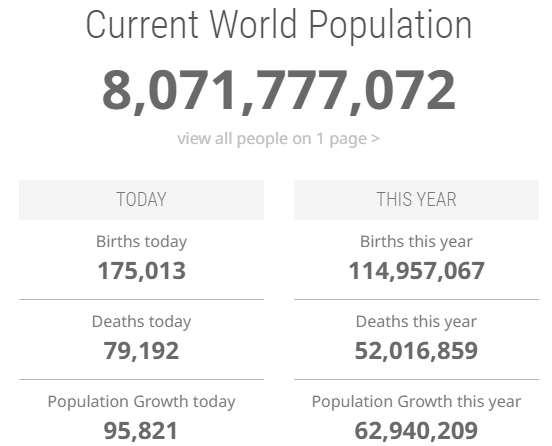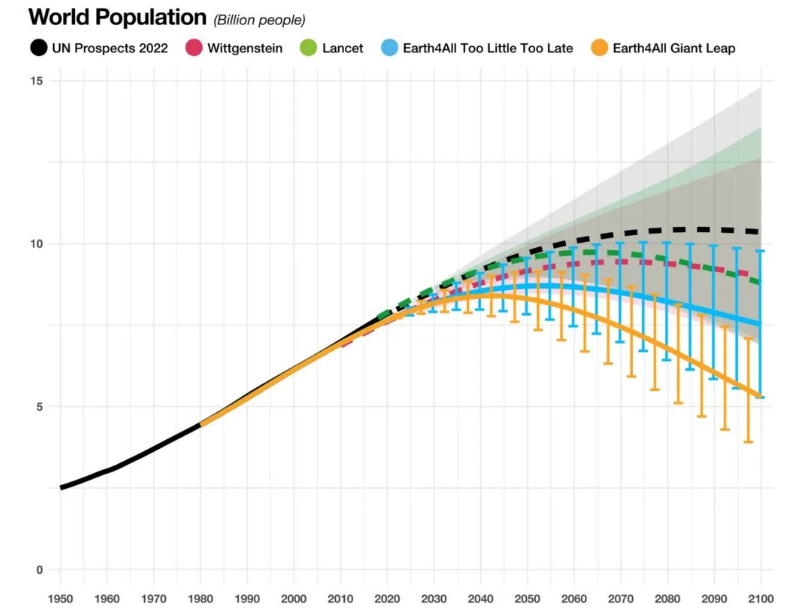Earth's population in 2100: Is the planet prepared
 Every minute of life should be appreciated (photo: Getty Images)
Every minute of life should be appreciated (photo: Getty Images)
As we live our own lives, we rarely think about the future of our children, grandchildren, and even more so, our great-grandchildren. The world is already experiencing processes that threaten humanity as a whole. How many people there are on planet Earth, their impact on the environment, and what scientists are predicting about the size of the population in the next few decades.
The following sources were used to prepare the material: Worldometer, ShortForm, LiveScience, United Nations, Daily Mail, Earth4All, UN DESA YouTube channel.
How many people are on the planet now
According to statistics, more than 8 billion people (about 8.071 billion) currently live on planet Earth.
This year, more than 114 million people were born (about 114,957) and more than 52 million people died.
The figures show that the world's population increased by more than 62 million people during the year.

Screenshot
Can the Earth "sustain" everyone?
Even though the population has grown rapidly over the past 200 years (there were about one billion people on Earth in the early 1800s), scientists' projections are disappointing.
According to a study by Canadian population ecologist William Rees, the number of people on Earth today exceeds the conventional norm. At the same time, humanity has grown too fast.
This has led to an unstable increase in the consumption of all the resources available on the planet. Experts argue that this has already led to negative consequences such as climate change, problems with waste and pollution, lack of exhaustible resources, etc.
Position of the UN
According to the United Nations, the world can expect a so-called "population explosion" shortly.
It is specified that in mid-November 2022, the world's population will reach 8 billion (from about 2.5 billion in 1950).
If this trend continues, the population could grow to nearly 10 billion by 2050. And by 2100, there will be more than 10.4 billion people.
This dramatic growth is mainly due to an increase in the number of people of reproductive age, a gradual increase in life expectancy, increasing urbanization, and accelerating migration.
At the same time, countries with the highest fertility rates tend to have the lowest per capita incomes.
Scientists' forecasts
Despite the UN's position, most scientists predict that the planet may experience a rapid population decline shortly - the so-called "population correction".
Even though humanity has learned to overcome most diseases, is not afraid of predators, and is struggling with food shortages, excessive consumption of natural resources and land depletion do not bode well.
Studies commissioned by the Club of Rome indicate that by 2050, the population growth trend may begin to decline. At the same time, during the peak period, humanity will reach a critical point of 8.6 billion people.
After that, by the end of the century, the world's population could decline by as much as 2 billion people.
In addition, scientists say the planet is facing mass extinction - by 2100, the Earth could lose about 27% of its living creatures.
European Commission scientist Giovanni Strona and Professor Corey Bradshaw of Flinders University in Australia conducted a study to create a virtual Earth and explore its future.
According to the results, the planet could lose 10% of all plant and animal species by 2050. The most dangerous type of extinction is called "co-extinction" - when one species goes extinct because another species has disappeared.
Potential causes of extinction
Per Espen Stoknes, project manager of Earth4All and director of the Center for Sustainability and Energy at the Norwegian Business School believes that birth rates could begin to fall, particularly as a result of a leap in economic development in low-income countries.
According to him, the most important variables related to the environment and the economy include excess energy, inequality, food production, income levels, and the effects of future global warming.
The Earth4All project has developed two development models. According to one (the more realistic), governments will continue to follow the trajectory of inaction on environmental issues. In this case, the world's population could grow to 9 billion people by 2050 and fall to 7.3 billion by 2100.
If governments begin to invest in the environment, education, and green energy, the population will grow to 8.5 billion by mid-century and decline to 6 billion by 2100.

Comparison of five population scenarios by 2100 (Infographic: Earth4All)
Canadian ecologist Rees also explained that the rapid decline in the number of people on Earth does not necessarily mean that billions of people will starve. Rather, it may be that people will have fewer children as resources become scarcer.
Thus, we can conclude that the human population will be affected by, among other things: climate change, pollution, the level of resource exploitation, and the approach to land use (excessive harvesting depletes the land, making it infertile).
Is the planet ready for such changes?
According to many scientists, the next few decades will be crucial for the future of global biodiversity and humanity as a whole.
Reducing the number of people on the planet will potentially change the environmental situation for the better. At the same time, the "loss" of more than a billion people over several decades could seriously undermine the global economy.
No one sees population decline as an exceptionally positive trend, because it will mean the "aging" of humanity. The new generations will bear the heavy burden of financing health care and pensions as the share of people of working age declines significantly.
A shortage of labor may cause problems in production. In addition, fewer people will be paying taxes, which could lead to an increase in public debt.
Thus, all of the population changes that will occur on Earth by 2100 will have both positive and negative consequences. Humanity must begin to live in harmony with nature now, remembering that only we can preserve the planet for our descendants.
Previously, we told you that a rare species of bird may disappear completely from the world - there are only 5 of them left.
This material is for informational purposes only and should not be used for medical diagnosis or self-treatment. Our goal is to provide readers with accurate information about symptoms, causes, and methods of detecting diseases. RBС-Ukraine is not responsible for any diagnoses that readers may make based on materials from the resource. We do not recommend self-treatment and advise consulting a doctor in case of any health concerns.

